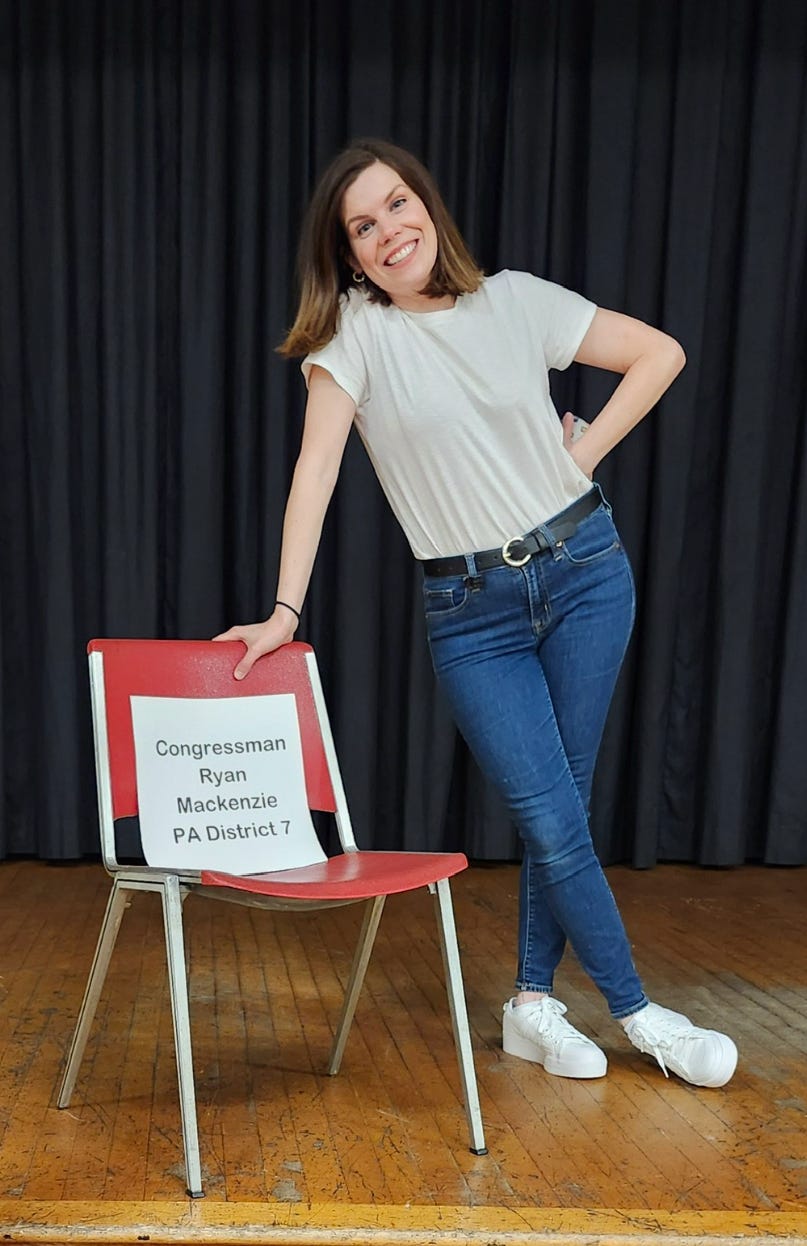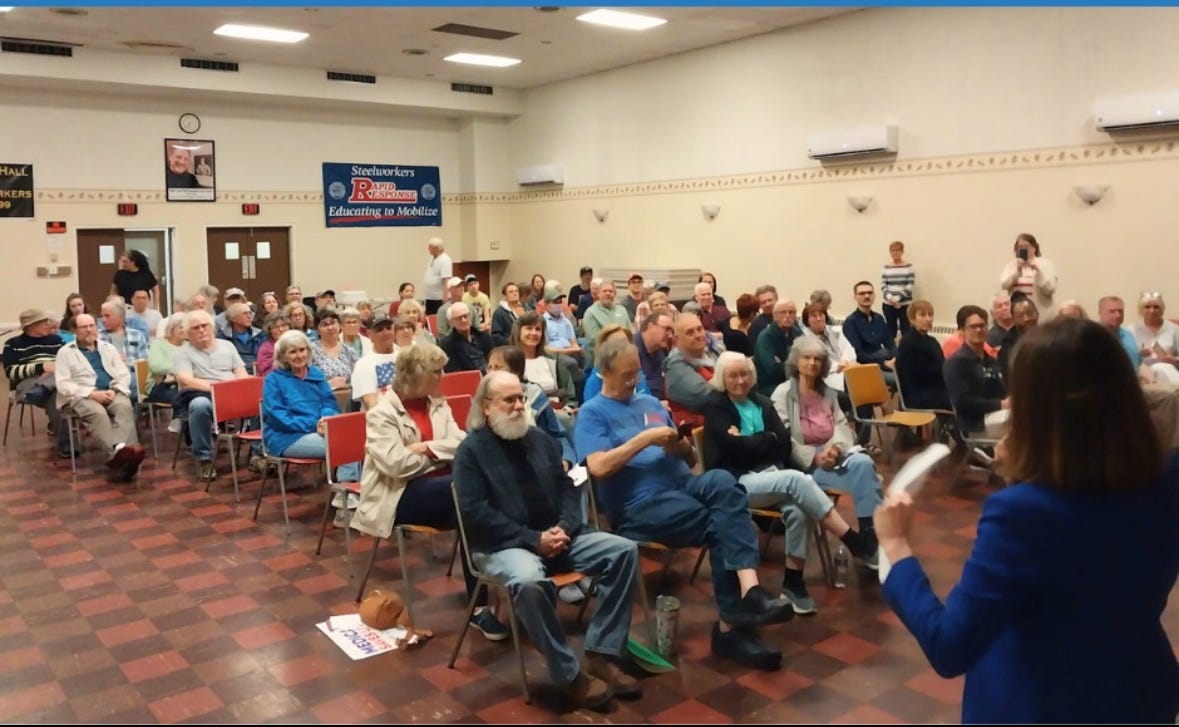"This is a thing where you build."
Only a few weeks ago, Laura Cummings felt alone in her outrage. Now she is helping grow a local movement.
Laura Cummings was nervous, but prepared. That’s how she ended up in a bathroom stall at the United Steel Workers Union Hall, taking deep breaths and trying to settle her nerves.
She had overprepared – that’s her nature. She thought through her lists. They had more than enough clipboards, pens, and copies of the handouts. They had tape, paper clips, sticky notes – all just in case. “I had everything, times ten,” she admits.
As she was running through her speech in her head, two women came into the bathroom. One asked the other: “What is this again? A town hall?”
“Yes, about Medicaid,” the other responded. “I heard a lady on a Bernie call speaking about it, and she was from right here in Lehigh Valley!”
“Oh no!” thought Laura. “These women are talking about me. What if they say I sounded awful on that call?” She considered staying in the stall until they left.
But instead, Laura popped out of the stall, smiling. She’s got a huge smile, the type that spreads across her face and out into a room. “Oh, that’s her!” said the woman, smiling back. Immediately, Laura wasn’t nervous anymore.
The USW hall was packed that night. Laura took the microphone and welcomed everyone, telling them that Medicaid is at risk and that now is the time to organize. Three weeks before, she had never done anything like this. But here she was, doing it. The speakers had five-minute slots, the call to action was prepared, sign-up sheets were at the door collecting email addresses.
The night went off without a hitch.

Laura was eleven when she was diagnosed with epilepsy, and it has shaped her life since. “You have to think about it all the time,” she explains. “My parents told me when I was growing up that I would always need to have a job that provided health insurance. They drilled that into me.”
Not having insurance coverage would mean that the two daily medications Laura takes would cost over $1,300 a month. Add that to the cost of housing, groceries, and keeping the lights on? “There is no world in which I will make enough money to cover that.”
When she was eleven and her parents were fretting over her future, no one was using the term “Universal Health Care.” Although other developed countries offer significantly more robust coverage for their citizens, the US has prioritized private coverage, typically accessed through employment. This has left over 27 million people in our country uninsured. For Laura, it means that she’s always taken jobs for the benefits: “I’ve worked jobs just as jobs, but I can’t take risks, change or leave a job because I can’t lose coverage.”
Laura was in college when she first heard about the idea that everyone could have healthcare coverage. She attended a speech of then-candidate Barack Obama and learned about his vision to expand coverage. Laura was instantly activated. “It’s like I had never considered that government could do something for me and people like me; I realized that we could actually make demands of our government to improve our lives.” She became a dedicated voter, never missing an election.
But nearly two decades have passed since then. Thanks to the Affordable Care Act, Laura now has a bit more security. Recently, her entire department was laid off. Still, she and her colleagues were able to access coverage through the exchange as they looked for new jobs —a game changer for someone whose daily medication costs overshadow her earning power. But Laura remains deeply aware of the fragility someone’s medical situation can put them in, not just in terms of health, but in terms of economic and emotional security.
American workers have a tenuous healthcare situation, to say the least.
“I’m probably pretty annoying,” admits Laura, laughing. She tells me that she’s always complaining to her friends and family, outraged at the Trump administration's posturing, policy, and disregard for the little guy. When she heard about the administration's plans to cut Medicaid through the Big Beautiful Bill, she just couldn’t sit still. “I know what it means to be scared about not having coverage.”
“I felt like I was the only person who cared as much as I do,” she admits. She looked to her elected officials for guidance on what to do, but came up empty-handed. She attended a few rallies put on by local organizations, and they felt hopeful, but wanted to do more. “I kept asking: What can I, as an individual, do? And the answer kept being ‘nothing.’ I wasn’t willing to settle for that.”
Finally, she joined a national Zoom call held by the Bernie Sanders team about the “Big Beautiful Bill.” On that call, Laura met three other people from the Lehigh Valley. They, too, were frustrated and eager to do more.
Pennsylvania District 7 is a swing district. 310,000 Pennsylvanians stand to lose their coverage because of the $1 billion in cuts included in the Big Beautiful Bill. The damage would be particularly brutal in the rural parts of the state, including areas of Lehigh Valley, where hospitals could close and even residents who don’t rely on Medicaid could lose access to care. Ryan Mackenzie, who represents PA7, seemed to be leaning towards supporting the bill despite all this. Laura and her emerging team wanted to hold him accountable to the people and places he represents.
Together, the team decided to host a town hall on Medicaid. None of them had known each other before that first call, and none of them lived in the same town or county. Most significantly, none of them had organized anything like this before. “We were all learning as we went!”
Due to the distance between them, the four organized their activities mostly online. They had Zoom calls together and created a group chat to communicate. Laura became the de facto leader of the group because the others had full-time jobs, and she is currently unemployed. “After our meetings together, I’d summarize the notes and make a Google document with a to-do list. Then everyone would jump in and put their names next to what parts they would work on. We self-selected into roles. One person was doing outreach, one was securing the venue, etc.”
Laura found securing speakers to be the most challenging part of organizing the event. She and her team decided to “divide and conquer” the outreach, thinking through their connections, relationships, and who knew who. “It was hard to get responses; you need to know you are going to get rejected a lot, but don’t let that get you down!” She says she would send emails and get no response, so she would pick up the phone. While most people were very supportive, it was hard to ask them to take a risk and join her. But that’s what she did. In the end, the group successfully got a full slate of speakers. They also opened the microphone to the floor, and people from all over Lehigh Valley took the opportunity to speak.
They invited Mackenzie. They wanted him to be a part of the conversation. Laura called, emailed, and went to his office. He never responded to her invitations.
Laura shared her story at the town hall, too. She talked about her epilepsy and her fear of losing coverage, about the cost of her medication. She shared her belief that we should be able to make demands of our government and ask for the things we need. “The whole experience was emotional,” she admits. “I got teary-eyed at some point and had to stop and take a breath. But I wasn’t the only one— other people had to take a minute, too.”
It didn’t matter that she had to take a minute. It didn’t matter if she stumbled over her words. It didn’t matter if she forgot a line or ad-libbed another. “As I was up there, I realized this isn’t an audition or a performance– we are all here for the same reason. We are here to do the same things. We are here because we care.”
A week and a half after their town hall, Congress passed the Big Beautiful Bill and slashed Medicaid and SNAP. Laura’s representative, Ryan Mackenzie, who never replied to her or the people at the town hall, voted for it.
Regardless, when I talk to Laura again, she’s upbeat. I’ve spoken with her enough to know that this is just her personality, but it’s also very earnest. The town hall's turnout had been huge: 96 people came out that night, and dozens shared their stories and concerns. In just three weeks, that’s a huge change for Laura. It was only a month ago that she was worrying that she was the only person who cared– now she knows she was wrong.
“The town hall was just the beginning, and it wasn’t just about this bill; it’s about people. Look at what four people pulled off in three weeks,” she said. “Now we have nearly 100 people we can turn to who we know are with us and say, “What can 100 of us do?” It only grows from here.”
Laura and her new friends have named their group: PA 7 United. “We plan on continuing with town halls, getting involved with other organizations in our area and fight for the welfare of our fellow citizens in PA District 7,” she says.
Maybe it was the crash course of a three-week campaign, or maybe it's the heaviness of this political moment, or maybe it's the heat of the summer, but Laura is already speaking like a seasoned organizer. “This is a thing where you build. Every time you bring in a few more people. And then build more. I’m looking at the midterms,” she says. “That’s just over a year away.”
“Seems doable?” I ask.
“Totally doable,” she says.



That's great organizing! Best of luck to Laura and her community. Thank you Gwen for showing us what is possible at this critical moment.
Awesome reporting, and an inspiring story. Thank you so much for your work!